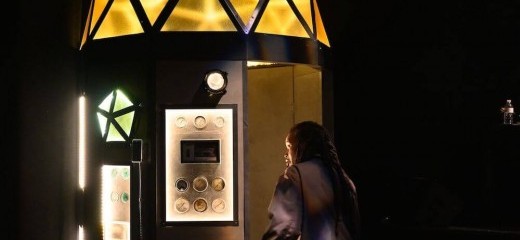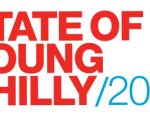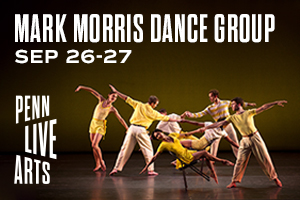
An Electrifying Choreopoem from Moor Mother
by Mira Treatman
Circuit City is Philadelphia musician/composer Moor Mother’s first ever theatrical work. The black quantum futurist choreopoem brought down the house as the final installment of the FringeArts High Pressure Fire Service festival through ecstatic poetry and movement interludes written by Moor Mother, also known as Camae Ayewa.
The work commences in a domestic space. Ayewa sits in a cozy living room with her primary scene partner, Elon Battle, who casually reads a book on a soft couch. They portray two friends, perhaps roommates, who enjoy their shared space. To their right is a space-age portal doorway, presumably to another dimension or time. The portal, fully decked with working lighting and space travel equipment, could easily host a small family as they safely make their way.
Upstage of the living room are bandstands housing the liberation-oriented free jazz ensemble, Irreversible Entanglements. These elements—the domestic, the futurist, and the free jazz—meld together through Ayewa’s singular vision.
“You can’t go to war without a drum,” she bellows, “you can’t time travel without free jazz… It ain’t free jazz if it don’t raise up generations.” This is one of many standout lines of Ayewa’s poetry that functions as both an earworm and mantra. Her voice sounds youthful yet deep with life experience, regal yet relatable.
Ayewa’s own sound design features a very hot microphone with a sound level turned up high. This affords her the option to yell softly, literally and figuratively. With the support of her massive band in tow, she produces a huge wall of sound with an elegant, streamlined production quality. Her use of technology provides the greatest possible impact, with a minimal amount of energy spent; her effortlessness in occupying the stage makes it seem she is very at ease.
Her movements are contained in her immediate and powerful kinesphere. She bobs a knee to a distinctive internal rhythm, independent of the backing band. She gazes toward an undefined focus straight ahead of her, as if she’s performing in a future space and time. Her facial expressions reflect both a perceived joy of performing and the tension inherent to the content of her work.
Circuit City is grounded by its formal structure, an Afro-futurist song cycle and choreopoem. Ayewa launches into individual tracks backed by the full band. The accompanying music is rooted in free jazz in the lineage of Sun Ra. Over time this launch into the noise becomes discernible and I catch a downbeat even if it’s not a downbeat per se, but more of the ensemble’s collective breath to start a new poem.
Questions of temporality arise. The crux of Moor Mother’s work relates to her involvement with Black Quantum Futurist Collective’s mission of “activism in marginalized communities through an alternative temporal lens.”
Circuit City succeeds in portraying altered temporality, especially through the musical compositions. I try to fit the work, as I experience it in real time, into the recognizable and comfortable. I accept though that it is not meant to be followed in linear patterns.
Ayewa chants, “A date is a symbol of a moment, not the moment itself. Linear history is frozen history that cannot be unchanged, which is therefore bullshit. Time travel is real. African time is past and present intersecting, as a dynamic force.”
By dubbing her theatrical work a “choreopoem,” Ayewa is aligning herself with Ntozake Shange, the creator and performer who coined the term with 1976’s For Colored Girls Who Have Considered Suicide / When the Rainbow is Enuf. Following in this tradition Ayewa uses her unique and fully-embodied voice as a means of poetic, political instrumentation.
The circuit in Circuit City refers to the oppressive grid that Ayewa is trying to escape through the portal. This could represent many cities, with Philadelphia, home to eminent domain and the MOVE bombing, certainly at the forefront.
In the theatre lobby, the Philadelphia Tenants Union has literature available for ticket holders to get better educated on the crises—gentrification, segregation, displacement, affordable housing, and law enforcement as it interacts with race, class, gender, and other intersections. The literature’s language is written for an audience assumed to be unfamiliar with the issues.
Ayewa is very specific about what she believes and what she is fighting for. She wants to liberate the residents of Circuit City. She calls out Comcast, Pfizer, and Johnson & Johnson as proliferators of injustice locally who band together around maintaining “white male utopia built on the backs of blackness.”
“No more wires inside of me. Who is surviving me?” Ayewa calls out repeatedly. Eventually the performers, mostly comprised of the bandmates, enter the portal one by one, and the community makes a collective escape.
The cast returns for bows. Ayewa is beaming. They went to war, they have their drums.
Circuit City, Camae Ayewa with Moor Mother & Irreversible Entanglements, FringeArts, June 20-22.
By Mira Treatman
July 31, 2019








